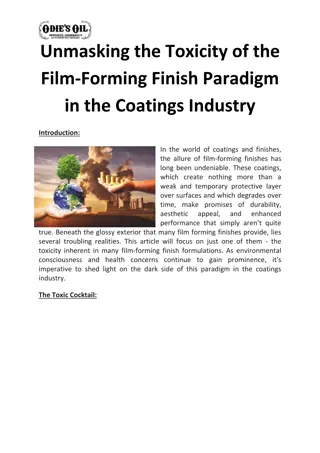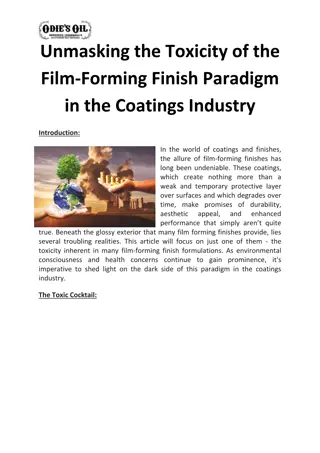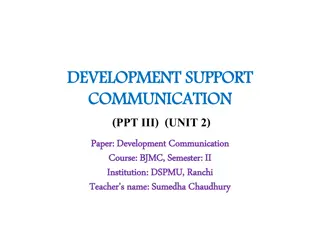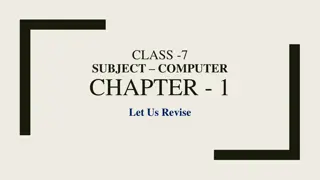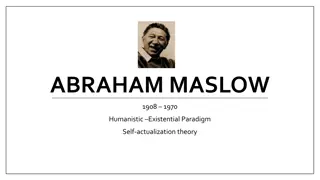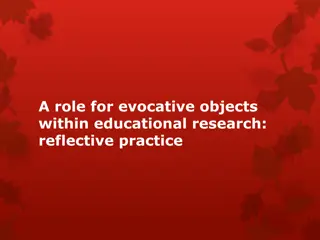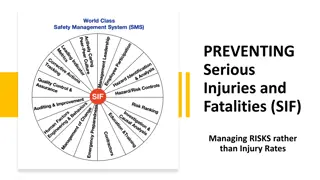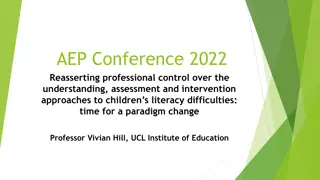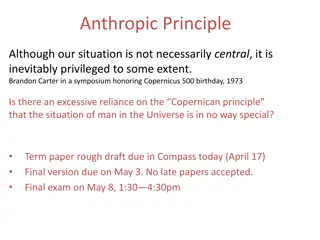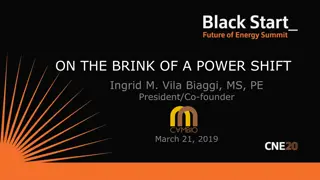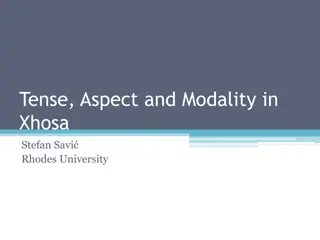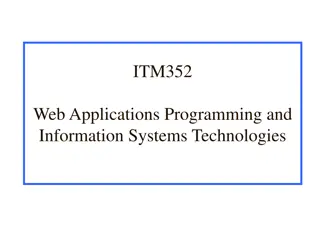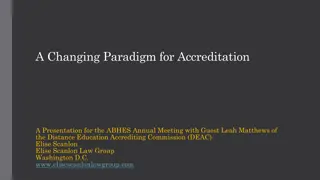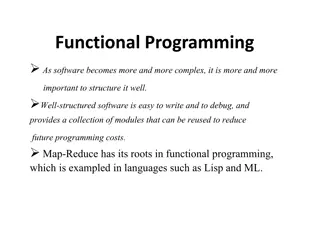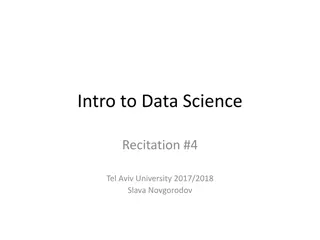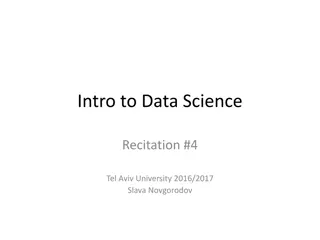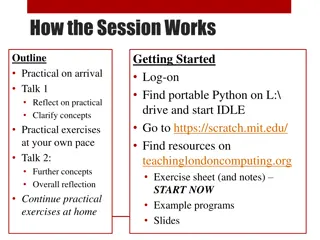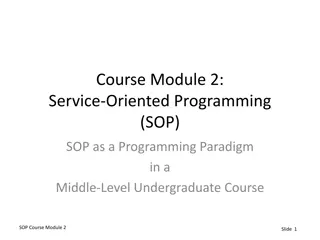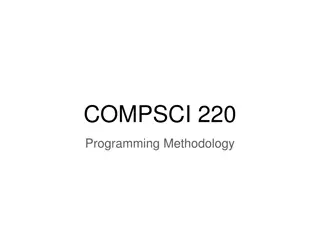A New Paradigm for Spasticity Management
New approach to managing spasticity, a disorder characterized by increased muscle tone and exaggerated tendon jerks. The author, Dr. Darryl Kaelin, explores the benefits of this new paradigm and its potential impact on motor control. The article also includes information on the etiologies and preval
1 views • 39 slides
Functional Programming
Functional programming, a paradigm that emphasizes declarative programming, pure functions, and limited side effects. Explore the benefits and characteristics of functional programming languages.
0 views • 20 slides
[PDF⚡READ❤ONLINE] Black Hole Astrophysics: The Engine Paradigm (Springer Praxis
\"COPY LINK HERE ; https:\/\/getpdf.readbooks.link\/B00DGEQPXS\n\nRead ebook [PDF] Black Hole Astrophysics: The Engine Paradigm (Springer Praxis Books) | Black Hole Astrophysics: The Engine Paradigm (Springer Praxis Books)\n\"\n
0 views • 6 slides
Dostarlimab 7.5 mg /5 ml: Transforming Cancer Care Landscape in India
Cancer care in India is undergoing a paradigm shift with the introduction of a new immunotherapy treatment: Dostarlimab. This potent formulation (7.5 mg\/5 ml) promises to change the treatment paradigm for oncologists as well as patients fighting cancer. Dostarlimab 7.5 mg\/5 ml is a revolutionary i
5 views • 7 slides
Unmasking the Toxicity of the Film-Forming Finish Paradigm in the Coatings Industry
Exposure to toxic fumes emitted by film-forming finishes during application and drying poses significant health hazards to workers and occupants of coated spaces. Painters, contractors, and DIY enthusiasts are particularly vulnerable to inhaling harmful chemicals, leading to respiratory ailments, he
1 views • 5 slides
Unmasking the Toxicity of the Film-Forming Finish Paradigm in the Coatings Industry
Exposure to toxic fumes emitted by film-forming finishes during application and drying poses significant health hazards to workers and occupants of coated spaces. Painters, contractors, and DIY enthusiasts are particularly vulnerable to inhaling harmful chemicals, leading to respiratory ailments, he
1 views • 5 slides
Decision Analysis and Operations Research in Management
This content delves into Management Decision Analysis and Operations Research techniques such as Linear Programming, Integer Linear Programming, Dynamic Programming, Nonlinear Programming, and Network Programming. It covers the phases of an Operations Research study, mathematical modeling for decisi
0 views • 36 slides
Evolution of Development Communication Paradigms and Alternative Paradigm
Development Communication explores the stages of creating a plan, implementing strategies, and ownership paradigms in development projects. Emphasis is on participatory approaches, community empowerment, and inverting top-down processes. The concept of Alternative Paradigm emerges to counter the ali
0 views • 6 slides
Module 2: PSEA and Safe Programming Training of Trainers (ToT) by CRS HRD
This Module 2 focuses on PSEA and Safe Programming, covering key sessions on understanding safe programming, identifying protection and SEA risks, and mitigating risks. It emphasizes the importance of safe programming in increasing safety, dignity, and access, with staff playing a crucial role. Part
2 views • 19 slides
Understanding Computer Programming: Basics and Beyond
In this chapter, we delve into the fundamental concepts of computer programming. We explore the definition of a program, the role of programming languages, types of programming languages, and generations of programming languages. Additionally, an assignment is provided to reinforce the key learnings
0 views • 25 slides
Understanding Abraham Maslow's Humanistic Existential Paradigm
Explore the key concepts of Abraham Maslow's humanistic existential paradigm, including self-actualization theory, perspective, and views on need gratification. Learn about Maslow's belief in human potential, the motive for self-actualization, and the importance of need gratification in realizing in
1 views • 81 slides
Understanding Object-Oriented Programming (OOP) in Python
Python is a versatile programming language that supports various programming approaches. Object-Oriented Programming (OOP) is a popular method in Python where objects are created to solve programming problems. OOP in Python focuses on creating reusable code, following the principle of DRY (Don't Rep
1 views • 35 slides
Evolution of Strategic Management in Tourism: A New Paradigm
Explore the radical transformations in strategic management over the past 25 years, focusing on the New Strategic Theory and the Half Moon Bay Group initiatives. Discover how complexity, non-linearity, and fluidity guide the new emergent paradigm. Learn about the changes in approach to strategy and
3 views • 11 slides
Introduction to Computers and C++ Programming Lecture 1 - Overview and Basics
This lecture covers the fundamental concepts in computer systems and programming using C++. Topics include the main components of a computer, bytes and addresses in memory, computer systems hardware and software, understanding programs, programming languages, compilers, preparing and running C++ pro
1 views • 21 slides
Web Application Development and Programming CTE Program Overview
Viera High School offers a comprehensive CTE program in Web Application Development and Programming, taught by Mr. Dohmen. Students learn popular programming languages like Python, SQL, JavaScript, Java, C#, and C. The courses cover web programming, JavaScripting, and PHP programming, providing cert
1 views • 7 slides
Introduction to Programming with RobotC in Robotics Education
Programming in robotics involves giving specific directions to a robot using software like RobotC. This introduction covers the basics of programming, software organization, and how to get started with RobotC through creating flow charts and programming tasks. Learn about setting up RobotC, creating
0 views • 8 slides
Introduction to Programming and Computer Instructions
Programming is the process of creating instructions for computers to follow and accomplish tasks. It involves turning human language instructions into detailed binary machine language. Before learning programming, individuals may have different levels of experience, ranging from no experience to pro
0 views • 16 slides
Evocative Objects in Educational Research: A Reflective Paradigm
Delve into the role of evocative objects in educational research through a reflective practice approach, exploring generative and divergent analysis models, and considering alternative quality criteria. The creative analytic paradigm emphasizes the serendipitous nature of engaging with objects for a
0 views • 21 slides
Understanding Object-Oriented Programming (OOP) in Python
Object-Oriented Programming (OOP) is a programming paradigm that focuses on organizing code into objects with attributes and behaviors. Python supports various OOP concepts such as classes, objects, inheritance, polymorphism, abstraction, and encapsulation. Classes serve as blueprints for creating o
0 views • 29 slides
Development of Attosecond Theory for Nobel Prize through Verilog Programming
Attosecond generation is a crucial technique for creating attosecond pulses by manipulating radiation waves. This research paper focuses on developing the Attosecond generation equation through Verilog programming and validating it using test programming techniques. The interface between equations,
0 views • 15 slides
Preventing Serious Injuries and Fatalities (SIF): A Paradigm Shift in Workplace Safety
The SIF approach emphasizes managing risks over injury rates to prevent serious workplace incidents. Traditional safety metrics focusing on minor injuries may not effectively prevent SIF events. Special attention and a new safety paradigm are needed to address high-risk workplaces and protect worker
0 views • 16 slides
Paradigm Change in Addressing Children's Literacy Difficulties
Professor Vivian Hill advocates for a paradigm change in understanding, assessing, and intervening in children's literacy difficulties at the AEP Conference. Challenges in the field are discussed, including the need to move towards inclusive, universal responses for all children with literacy delays
0 views • 28 slides
Understanding the Anthropic Principle and the New Paradigm in Physics
Exploring the Anthropic Principle and the New Paradigm in physics, this content delves into the concept that our existence is inevitably privileged, as well as the potential unification of Quantum Mechanics and General Relativity. It reflects on the conditions necessary for life, the role of physica
0 views • 17 slides
Embracing Paradigm Shift Towards Distributed Power and Clean Energy
The paradigm shift towards distributed power and clean energy brings about a transformative future where individuals play an active role, leading to a society with a stronger local economy integrated globally through innovative exchanges. Technology empowers users to create content and participate i
0 views • 5 slides
Future Mobility: A New Paradigm in Legal Frameworks and Technology
Explore the evolving landscape of future mobility through the lens of legal frameworks and technology advancements. Delve into how traditional taxonomies are inadequate for modern transport innovations, emphasizing the significance of data in conjunction with movement in this dynamic paradigm.
0 views • 23 slides
Tense, Aspect, and Modality in Xhosa Verbal Paradigm
This study on Xhosa language by Stefan Savi from Rhodes University delves into the intricate aspects of tense, aspect, and modality in the Xhosa verbal paradigm. It discusses the structure of Xhosa, its unique features, and how these elements manifest in different tenses and aspects, shedding light
0 views • 42 slides
CS252 Systems Programming Course Overview
This course overview covers topics such as C programming review, Unix basics, Unix systems programming, and grading details. The course includes labs on C/C++ programming, Unix shell scripting, and writing your own shell. Communication is emphasized through Piazza for questions/answers and Blackboar
0 views • 41 slides
Introduction to Programming Languages and Functional Programming with OCaml
Welcome to Lecture 1 of CSEP505 on Programming Languages focusing on OCaml and functional programming. Professor Dan Grossman introduces the course, discusses the importance of studying programming languages, and shares insights on course mechanics and content. Topics include staff introductions, co
0 views • 84 slides
Understanding ITM352 and Its Role in MIS
Welcome to ITM352, a course focusing on acquiring basic programming skills in a business context. This course emphasizes hands-on experience in developing relevant software applications, addressing real technology problems, and fostering rapid self-learning of IS/IT technologies. Misconceptions arou
0 views • 36 slides
Changing Paradigm in Accreditation: Legislative Landscape and Recommendations
This presentation discusses the evolving paradigm in accreditation within the education sector, focusing on legislative updates, including the introduction of bills, hearings, and the shifting responsibilities of accrediting bodies. It also highlights the recommendations put forth by the HELP Task F
0 views • 11 slides
Understanding Functional Programming Paradigm
Functional programming emphasizes well-structured software that is easy to write and debug, with reusable modules to reduce future programming costs. It introduces higher-order functions and first-class function values, fostering declarative programming for tasks like symbolic data manipulation and
0 views • 21 slides
Introduction to Map Reduce Paradigm in Data Science
Explore the MapReduce paradigm in data science through examples, discussions on when to use it, and implementation details. Understand how MapReduce is utilized for processing and generating big data sets efficiently.
0 views • 52 slides
Introduction to MapReduce Paradigm in Data Science
Today's lesson covered the MapReduce paradigm in data science, discussing its principles, use cases, and implementation. MapReduce is a programming model for processing big data sets in a parallel and distributed manner. The session included examples, such as WordCount, and highlighted when to use M
0 views • 48 slides
Essential Principles of Teaching Programming Languages
Foundational concepts in programming form the core of computing. This encompasses understanding programming fundamentals, teaching language aspects effectively, statistical programming for data analysis, and guiding students unfamiliar with programming environments towards grasping the logic and sim
0 views • 23 slides
Exploring Computer Programming Principles
Dive into the world of computer programming, covering high-level and machine languages, compilers, interpreters, writing programs, top-down design, and the array of programming languages available. Understand the essentials of building code to control computers, the diversity of programming language
0 views • 23 slides
Transitioning from Scratch to Python: A Practical Approach for Learning Textual Programming
Explore the transition from visual programming in Scratch to textual programming in Python using Turtle Graphics. Engage in practical exercises, clarify key concepts, and reflect on the challenges and progress in learning core programming concepts. Utilize resources from TeachingLondon Computing to
0 views • 21 slides
CS 288-102 Intensive Programming in Linux Spring 2017 Course Details
Learn Linux programming, C language proficiency, Bash scripting, and more in this intensive course taught by Instructor C.F. Yurkoski. The course covers programming in Linux environment, command line interface, C language, client/server programming, and essential programming concepts like pointers,
0 views • 31 slides
Understanding the Body, Soul, and Spirit Paradigm in Human Existence
Exploring the concept of ternary anthropology introduced by French anthropologist Michel Fromaget, which views humans as composed of body, soul, and spirit. This paradigm, rooted in both Eastern and Western traditions, delves into the ontological value of the mind and the overall human experience. T
0 views • 36 slides
Understanding Service-Oriented Programming in Middle-Level Courses
Service-Oriented Programming (SOP) is a new programming paradigm focusing on using services to design and develop integrated business applications. This module covers the importance of SOP in current application development, fundamental concepts of web services, standards underlying service-oriented
0 views • 22 slides
Functional Programming Concepts for COMPSCI 220 Programming Methodology
In this tutorial, we explore functional programming concepts in the context of COMPSCI 220 Programming Methodology. We delve into writing functions using `reduce` and discuss examples and implementations of various functions like sum, product, and string length calculation. We also analyze the diffe
1 views • 47 slides


![[PDF⚡READ❤ONLINE] Black Hole Astrophysics: The Engine Paradigm (Springer Praxis](/thumb/21503/pdf-read-online-black-hole-astrophysics-the-engine-paradigm-springer-praxis.jpg)

